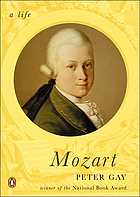
Mozart
A Life
کتاب های مرتبط
- اطلاعات
- نقد و بررسی
- دیدگاه کاربران
نقد و بررسی

May 31, 1999
In the new Penguin Lives series, edited by former New York Times editor James Atlas, Gay's Mozart biography comes with particularly high expectations, given the author's distinction as a historian (he won the National Book Award for volume one of The Enlightenment). There is little new information here, yet Gay's overview of the composer's life and work is lucid and concise. Noted for his studies of Freud and Victorian society, the author clearly knows the Mozart literature as well. His book includes a fine bibliographical essay, in which he admits to leaning on Maynard Solomon's 1995 tome, Mozart: A Life. Gay provides brief glimpses into the social and historical contexts of Mozart's music: changing attitudes toward listening, the economics of composition and new audience sectors. Also notable is the discussion of how well Mozart's works were received and the author's survey of how Mozart was regarded by subsequent composers. Gay offers a straightforward and helpful introduction to Mozart, debunking romantic interpretations of the composer's life. (Gay maintains that Mozart's burial in an unmarked grave was due to the practice of the period, when extravagant funerals were frowned upon, rather than to poverty.) However, in a book this size, it's hard to stay away from the occasional oversimplified phrase (Mozart "could not have written mediocre music if he tried"). While Gay's judgments of Mozart's works are mostly unsurprising and in line with general opinion, they are discussed vividly and with enthusiasm--and bolstered with famous quotes and thorough references. BOMC selection.

May 1, 1999
Noted cultural historian and Freud scholar Gay, author of the autobiographical My German Question (LJ 8/98), here presents an intriguing psychological exploration of the life and music of Wolfgang Amadeus Mozart. Using copious excerpts from Mozart's family's letters and drawing on a variety of secondary sources, Gay constructs a portrait of a developing genius who appears obsessed with the scatological and financial aspects of his existence. Gay traces the artist's maturation in his relations with his father and other authority figures while describing the culminating musical masterpieces of Mozart's later years. Gay is an eloquent advocate for Mozart's place in the very highest echelon of composers. He performs a valuable service in debunking several myths, and his exemplary bibliographic essay directs readers to other relevant titles. Recommended as an illuminating guide to Mozart's psyche; seek elsewhere for musical analysis or straightforward biography.--Barry Zaslow, Miami Univ. Libs., Oxford, OH
Copyright 1999 Library Journal, LLC Used with permission.

January 1, 2000
YA-This "biography in the short form," chronologically arranged in eight chapters, is a real gem. Young adults will be attracted to the book because of its brevity. Serious classical musicians will enjoy it, and nonmusicians will learn nearly as much about music as they do about the man. Teens will appreciate Mozart's streak of independence, his dramatic flair, and his zest for life. The beautifully written and extensively researched work conveys a strong sense of the person as well as his contributions to the world of music.-Jean Johnston, Fairfax County Public Library, VA
Copyright 2000 School Library Journal, LLC Used with permission.

May 15, 1999
Gay, famous as a historian of the Enlightenment, brings a transparent prose style to a new entry in the Penguin Lives series, concerned with that transcendent Enlightenment glory, Wolfgang AmadeMozart (to give the form of his name that he preferred). Gay presents the composer's life as a succession of developmental periods, beginning with his childhood as "The Prodigy" and continuing through his roles as "The Son" of a domineering father, "The Servant" of the prince-archbishop of Salzburg, "The Freelance" musician at a time when entrepreneurship was new for artists, "The Beggar" of friends because of his improvidence, "The Master" of music who continued to grow in brilliance throughout his life, "The Dramatist" who understood how to make an opera grab an audience, and "The Classic" exemplar of musical genius that he has been regarded as ever since his early death. Despite the book's brevity, Gay also scotches several Mozart myths--not only that Salieri murdered him but that his anonymous burial reflects any ignominy. An ideal introductory life. ((Reviewed May 15, 1999))(Reprinted with permission of Booklist, copyright 1999, American Library Association.)

























دیدگاه کاربران